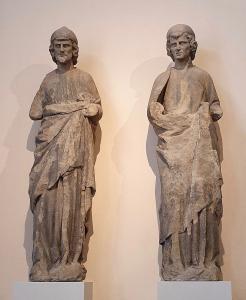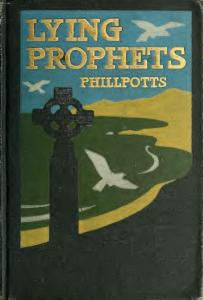 Back when I was teaching Hebrew Bible as part of my assignment on the faculty of Perkins School of Theology, I regularly used Deut.18 as a sort of satirical target in my discussions of biblical prophecy. I tried to make it as clear as I could that the interest of the Bible’s great prophets was not at all predictions of the future. To be sure, they talked of the future, but were far more interested in what YHWH was demanding of Israel now, in the present. Each of them, in their own unique ways, excoriated the chosen people for their refusal to follow the demands of their God, especially when it came to matters ethical: the treatment of the marginalized, epitomized by the widows, the orphans, the strangers, and the immigrant foreigners. Thoroughly unlike their modern counterparts, the many so-called prophets in our own time, they focused their sharp attentions on what God was saying to the people in their own day; I always liked to say these prophets were not “foretellers” but “forthtellers,” a handy and memorable linguistic twist that never failed to stick with my listeners.
Back when I was teaching Hebrew Bible as part of my assignment on the faculty of Perkins School of Theology, I regularly used Deut.18 as a sort of satirical target in my discussions of biblical prophecy. I tried to make it as clear as I could that the interest of the Bible’s great prophets was not at all predictions of the future. To be sure, they talked of the future, but were far more interested in what YHWH was demanding of Israel now, in the present. Each of them, in their own unique ways, excoriated the chosen people for their refusal to follow the demands of their God, especially when it came to matters ethical: the treatment of the marginalized, epitomized by the widows, the orphans, the strangers, and the immigrant foreigners. Thoroughly unlike their modern counterparts, the many so-called prophets in our own time, they focused their sharp attentions on what God was saying to the people in their own day; I always liked to say these prophets were not “foretellers” but “forthtellers,” a handy and memorable linguistic twist that never failed to stick with my listeners.
However, given the obvious truth of that claim about the ancient prophets, the question never failed to arise concerning the criteria by which a “true” prophet might be distinguished from a “false” one. After all, just as in our own time, any number of religious persons claimed the prophetic mantel, saying they had been sent by God to speak to the people of Israel. The classic example is found in Jeremiah 28 where we find two would-be prophets, Hananiah and Jeremiah, squaring off against one another in public concerning the matter of Israel’s upcoming defeat and exile at the hands of the Babylonians. The former announces that according to YHWH, the exile will be brief and not really debilitating, while Jeremiah to the contrary warns that Israel will find itself in that foreign land for a good many years. The names of both of these men are formed with the short form of the name for YHWH, hence it would be very difficult to discern merely from their words which one could be trusted to be proclaiming the true word of YHWH. Of course, by hindsight we know that Jeremiah proved correct, so we may conclude that he was the true prophet, while Hananiah is reduced to a kind of mountebank, a huckster offering easy words rather than true and demanding ones.
I would suggest that it is precisely from a story like that one that the author of Deuteronomy may have formed his thoughts found in today’s text. After all, if I had overheard the debate between Hananiah and Jeremiah, how could I have discerned who was actually speaking for God? Knowing me as I do, I could very likely have found Hananiah far more appealing. Who would not prefer and brief exile to a lengthy one? But the question concerning how one can tell who is the trustworthy prophet is found exactly at Deut. 18:21: “So, you may say to yourself, ‘How can we know the word not spoken by YHWH?’” Exactly! Are there any explicit criteria by which we can judge a true or false prophet? Deuteronomy’s answer, as I said, has served as the source of considerable laughter when read in a classroom full of eager Bible students. Allow me to translate the words as literally as I can. “When (or “if”? NRSV) the prophet speaks in the name of YHWH, and the thing is not, or does not come, that word is not YHWH’s. The prophet has spoken insolently (or “presumptuously”); you need not fear it” (Deut.18:22).
The criterion for recognizing a true prophet of God appears to be whether or not the announcement of the prophet actually happens, literally comes to pass. When Jeremiah says that Israel will go into exile and will remain in exile for a long time, and that actually happens as Jeremiah has announced, then we can know that Jeremiah is the true prophet of YHWH. Of course, there is an obvious problem, if that is how the text is to be understood. Since I have no crystal ball available, but am limited to my human discerning only, how in the world am I to choose who is the true prophet from among the welter of self-chosen figures who claim special callings from God? It seems a very poor, and finally ridiculous, assertion in the attempt to pick out the true prophet, does it not? Indeed, if that is what Deuteronomy has in mind, then I am little helped when I am faced with vast numbers of competing announcements from the chattering clouds of preachers and prophets who crowd the airwaves and TV screens and Twitter feeds of 21st century US America.
Is it possible to hear what Deuteronomy is saying in a different way? “When a prophet speaks in the name of YHWH, and the thing is not,” he says. May that mean something like the word is exactly nothing; it is finally devoid of content, rendered empty by the context of its utterance? Though he does go on to imply that if “nothing comes” or “nothing happens,” that suggests that the prophetic word is not a true one. I want to think that these in the end are two different criteria offered by Deuteronomy to discern false prophecy from true. I wish to explore the former one—namely that the word uttered is “nothing,” without content. A recent example springs to mind.
During the recent deplorable assault on the capitol in Washington on Jan. 6, 2021, incited by Donald Trump and several of his thuggish minions, an incitement that has led to a second impeachment of the former president, several reporters risked their very lives in order to record much of what went on inside the building after it had been breached by the rioters. I was especially riveted by a scene of a large number of the mob as they found themselves in what I believe was the well of the Senate chamber. There was a good deal of milling around, of the taking of “selfies,” of shouting and indiscriminant yelling, until a very loud voice is heard over the din, suggesting that all of them needed to pray! I admit to being quite startled by this action. Here they were, vandals against their own government, having shattered windows and doors, having spread their own feces and urine on the walls of the building, having stolen various items from several offices, including a laptop and the House Speaker’s lectern from Speaker Pelosi’s private office, and they were suddenly silenced by the call to prayer. For the next two minutes, the leader called down the power of God to aid them in their quest for what he imagined to be justice, I assume, in the matter of the “stolen” election (a proven lie), in the demand that “their” president, Mr. Trump, be reinstalled in the White House as the rightful leader of the country. All of that was requested from “our heavenly father,” a phrase repeated several times. I suggest to you that if any prophetic call could be judged as empty of content, quite literally vacuous, devoid of any real religious concern, that prayer in the midst of an assault is surely it.
I understand quite readily that those who heard that prayer that day who were in that chamber would sharply disagree. Many of them who participated in the attack saw themselves as nothing less than prophets, and appropriately called on God to bless their cause that they knew to be just. They were breaking all sorts of laws, but, as one said, after he was forced out of the building, “what else can we do? We have been ripped off by liberals and Democrats and communists, and have no other way to be heard.” If I were connected to his frame of mind, I would perhaps say nothing different. When Franklin Graham, son of the famed evangelist, Billy, and the CEO of the nonprofit “Samaritan’s Purse,” calls the ten Republican House members who voted to impeach Mr. Trump a second time, “traitors,” is he a prophet? Can his word be said to be from God, as he so claimed? For me the answer is obviously no; Graham’s tirade is completely self- generated, and has nothing whatever to do with God. Yet, if I am where he is religiously, do I hear his words as prophetic? I fear I am no closer to discerning just who is the true prophet here, and whether or not Deuteronomy means that the content of some religious speech is plainly empty or if nothing happens as a result of the speech, it seems abundantly clear that the context of the speech and the speaker is all. For me, any religious speech is necessarily judged by the one who speaks, the desired outcome of that speech, and the contexts in which the speech is made. I must conclude that Deuteronomy, however he is to be understood, is finally of little help with our problem. We are left with our own careful and reasoned thoughts to determine just who speaks for God, and no simplistic Bible verse by itself can in the end be determinative. So it must be always for those of us who take seriously Deuteronomy’s earlier charge that we are to “love YHWH our God with all our heart (that is our “will and intelligence”), life, and all our strength” (Deut.6:5), a phrase a later prophet, Jesus of Nazareth, chose as central for his own perceptions of what God ultimately demands of us.
(Images from Wikimedia Commons)










